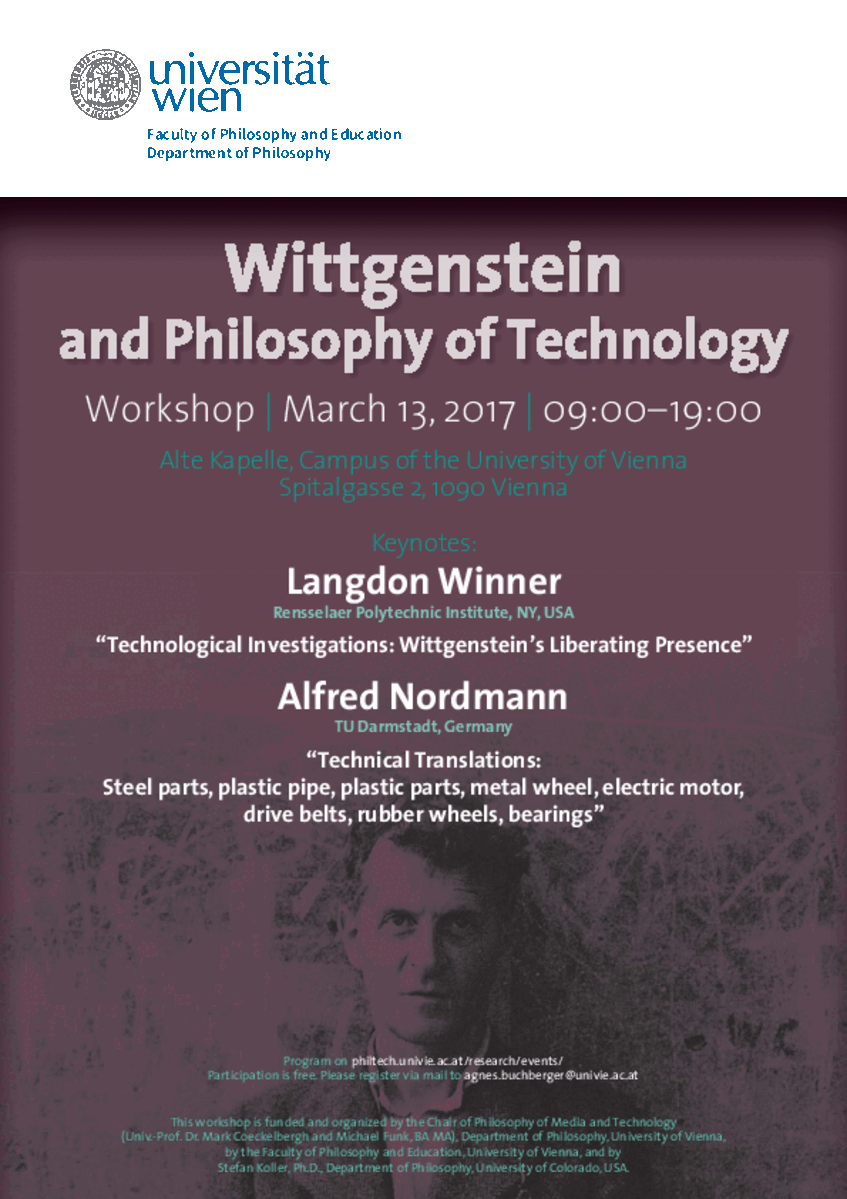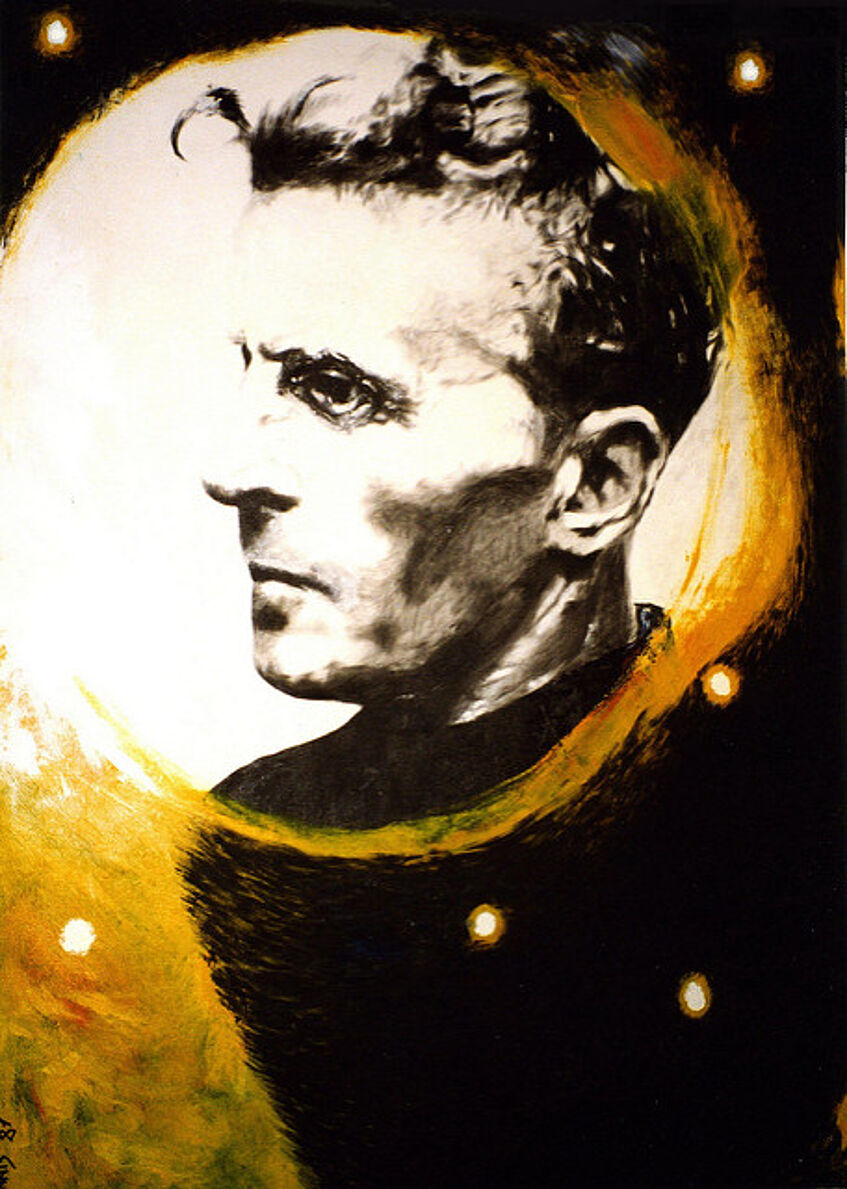Workshop "Wittgenstein and Philosophy of Technology"

Workshop "Wittgenstein and Philosophy of Technology"
Workshop Venue
Alte Kapelle, Campus of the University of Vienna
Spitalgasse 2, 1090 Wien
Find a map of the Campus here (venue marked with a red circle).
Please note that the venue (a historic building) unfortunately provides only limited infrastructure to accommodate disabled participants. If you require assistance to access the venue, we ask that you kindly contact us prior to the event (e.g. when you register) so we can make proper arrangements.
Registration
Participation is free but please register via mail to agnes [dot] buchberger [at] univie [dot] ac [dot] at.
Program
| 09:00 - 09:30 | Reception and Welcome Remarks |
| 09:30 - 10:30 | Keynote I: Langdon Winner “Technological Investigations: Wittgenstein's Liberating Presence” |
| 10:30 - 10:45 | Break |
| 10:45 - 12:45 | Panel I “Technologies as Forms of Life” “Technological Environments as Form of Life: Wittgenstein’s Linguistic Theory and Philosophy of Technology” Ingrid Böck, TU Graz “From Form of Life to the Technologically Extended (Social) Mind” Michał Piekarski, Cardinal Stefan Wyszyński University Warsaw “Technology and disease definition: Modes of this complex form of life” Lynette Reid, Dalhousie University “Technology Games and Forms of Life” Mark Coeckelbergh, University of Vienna |
| 12:45 - 14:00 | Lunch |
| 14:00 - 15:30 | Panel II “Rule Following and Technologies of Self-Cognition” “Artifacts as Rules: Wittgenstein and the Sociology of Technology” Mark Thomas Young, University of Bergen “Information Technology, Rule-Following, and Embodied Consciousness” Christoph Durt, University of Vienna “Wittgenstein on the idea of Mental Mechanisms and Information-StoringTechnologies” Thomas Raleigh, University of Vienna, King's College London |
| 15:30 - 15:45 | Break |
| 15:45 - 17:15 | Panel III “Cultures of Tool Use” “The Meaning of Use: Artifactual Holism versus Artifactual Compositionalism” Stefan Koller, University of Colorado “Wittgenstein and Technologies of the Self” Gerard Meagher, University of Limerick “Wittgenstein, Transcendental Techniques and the Grammar of Jazz Improvisation” Michael Funk, University of Vienna |
| 17:15 - 17:30 | Musical Intermezzo and Break |
| 17:30 - 18:30 | Keynote II: Alfred Nordmann “Technical Translations: Steel parts, plastic pipe, plastic parts, metal wheel, electric motor, drive belts, rubber wheels, bearings” |
| 18:30 - 19:00 | Podium / Closing Debate: “Talking Robots and Silent Meaning – Philosophy of Technology with and without Wittgenstein” Langdon Winner, Alfred Nordmann & Mark Coeckelbergh |
| 20:00 | Dinner |
CfP: Workshop "Wittgenstein and Philosophy of Technology"

Picture: Christiaan Tonnis, Ludwig Wittgenstein 2 via Flickr Creative Commons (CC BY-SA 2.0)
CfP: Workshop "Wittgenstein and Philosophy of Technology"
Download below
DATE 13 March 2017
VENUE TBA, Vienna, Austria
KEYNOTE SPEAKERS
- Langdon Winner, Department of Science and Technology Studies, Rensselaer Polytechnic Institute, Troy, NY, USA
- Alfred Nordmann, Institute of Philosophy, TU Darmstadt, Germany
INTRODUCTION TO THE THEME
Few philosophers of technology enlist Wittgenstein’s work when thinking about technology, and scholars of Wittgenstein pay scant attention to remarks about technology in his work. This double neglect of (aspects of) Wittgenstein’s work is symptomatic of a more general gap between philosophy of language and philosophy of technology. This workshop aims to close these gaps with presentations and discussions that use Wittgenstein to conceptually develop existing investigations in philosophy of technology and/or to better understand and evaluate technologies in the 21st century.
Questions to be discussed will include, but are in no way limited to, the following:
- Is Ludwig Wittgenstein a “forgotten” classical author in the philosophy of technology? Can we read Wittgenstein’s works in a way that renders these works helpful to the philosophy of technology?
- Conversely, could current positions and concepts in the philosophy of technology furnish a criticism of Wittgenstein’s thought, a criticism perhaps underdeveloped in or absent from the established reception (positive or critical) of Wittgenstein’s works?
- Can Wittgenstein's late reflections on use and forms of life add to, possibly even recitfy, current understandings of these notions in the philosophy of technology?
- What light, if any, does Wittgenstein's personal engagement with the engineering profession (from his studies in Manchester to his Vienna forays into building technology) shed on his subsequent engagements with philosophy?
- What can we learn from Wittgenstein to better understand how we talk to machines and how machines talk to us (e.g. social robots)?
- How can we use Wittgenstein to better understand the cultural, social, and political dimensions of contemporary technosciences such as synthetic biology (e.g. usage of the word “life”)?
- Does Wittgenstein help us to understand connections between language and technology in the internet of things?
- Can a Wittgensteinian approach contribute to addressing the problem of how to communicate specialized disciplinary terminology in transdisciplinary research?
CALL FOR PAPERS
A limited number of slots is available for non-invited papers.
Please send a 500 words abstract by 1 February 2017 to Agnes Buchberger if you want to be considered for inclusion in the workshop.
REGISTRATION
Registration to attend is free but obligatory.
For registration and organizational issues contact Agnes Buchberger
ORGANISATION
- Prof. Mark Coeckelbergh and Michael Funk, Philosophy of Media & Technology, University of Vienna, Austria
- Dr. Stefan Koller, University of Colorado, Colorado Springs, USA
This workshop is funded by the Chair of Philosophy of Media and Technology (Univ.-Prof. Dr. Mark Coeckelbergh), the Department of Philosophy, and the Faculty of Philosophy and Education, University of Vienna.
